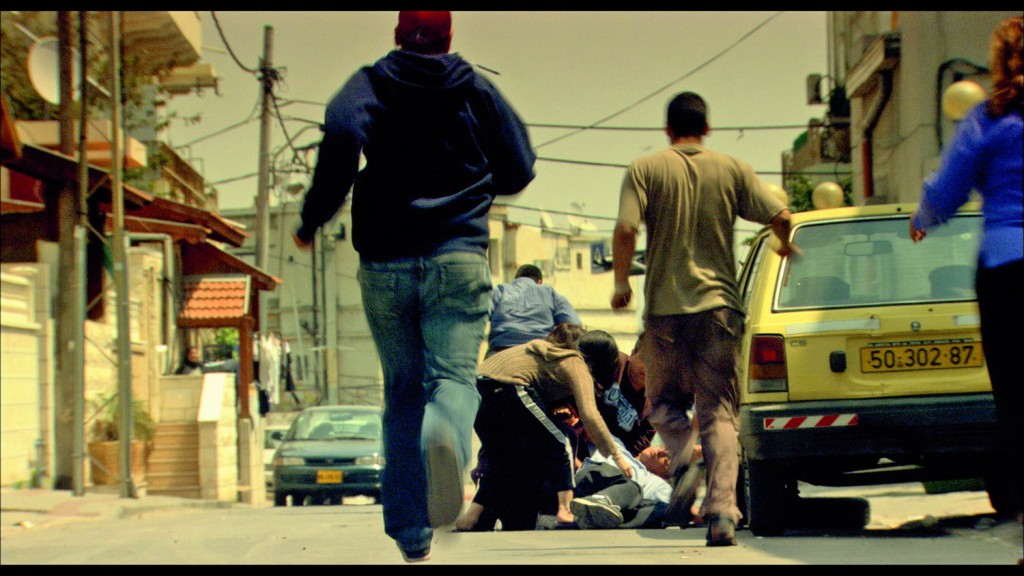It begins with a sketch, a boy drawing in pencil the scenes of his life in black on white. It is an interior scene, intimate and contemplative. The sound of the pencil on paper merges with the still childlike voice narrating his inner thoughts and sense of things to come. Moving on to another character – a boy out on the street in front of the house, fixing a car, sends his sister to fetch something. She leads the camera on another narrative path, as other characters and threads of narrative are briefly glimpsed on her route. Events take place and the camera follows different narratives and characters in the neighborhood of Jaffa that gives the movie its name: Ajami.
Muslims, Jews, Christians and Bedouins – the movie’s characters may come from different places but their stories come together in Ajami, a poor, crime ridden neighborhood where different people and cultures, brought together by circumstance, live side by side. The movies different characters and events may seem random and confusing at first – like stranger’s faces on a crowded street. Nasri (Fouad Habash) and his drawings, Malek (Ibrahim Frege) coming in illegally from Nablus to work in a restaurant, pleasure seeking Binj and Dando. Following one narrative path after another, moving freely through the timeline, the characters appear in different contexts, different in each.
The movie is dark – full of dimly lit interior scenes, underground parking lots and night scenes – and its journey is a dark one, into the interior. We become better acquainted with them as the movie takes us into their homes, minds and hearts. The characters may not always make the right choices, but they are no longer strangers for us and we care about the consequences of their choices. By the end of the film we realize that what we think happened, the events we have seen, don’t tell the full story. The full story, the human story is a tangle of interconnected stories, the story of the mysterious ways in which people are connected to one another.
If I had been given a summary of the movie’s plot, I might not have been attracted to it, as its events belong to a genre I don’t particularly like. Yet Ajami is so much more than its plot, as people are so much more than a description of the circumstances of their birth and the events of their lives. One of six Israeli feature films competing for the Wolgin Award, the movie received the Caméra d’or – Special Mention at the Cannes Festival, and I believe that it will and should continue to garner awards and praise.
After the screening, directors Scandar Copti and Yaron Shani addressed the audience. “Hundreds of people made this film,” said Shani, “people opened their homes, gave us their cars and participated as extras without pay.” Copti thanked Shani saying, “Even when I stumbled and fell – I even cried on the set once – he had the strength to lift us both up.” Thankful for the support of their families, Shani said, “We were unemployed for seven years.” Some of the movie’s participants were unable to make it to the festive screening, but all those present gathered together onstage, with hugs and smiles all around. Shani commented, “These people never dreamed that they would be in a crazy movie that didn’t even have a script.”
At the reception following the movie I chatted with Ibrahim Frege, from Kfar Kassem, who plays Malek with endearing sweetness and integrity. 19 year old Frege said he had never thought of acting. While still in school, friends who participated in workshops of “Peace Child Israel” (an organization founded in 1988 by David Gordon and Yael Drouyannoff to teach coexistence using theater and the arts) invited him to come along just for fun. He participated in the theater workshop for a year, and then received a phone call asking him if he would like to be in the movie. He thinks they were looking for someone with an accent similar to that which might be heard in Nablus, his character’s hometown. Frege enjoyed his acting experience. He is not planning on making it a career, but would be happy to participate in another project like Ajami.
Ajami
Scandar Copti, Yaron Shani
Israel 2009, 120 minutes, Arabic and Hebrew, Hebrew and English subtitles
AYELET DEKEL







[…] Dekel di Midnight East ci racconta la sua reazione [in] dopo aver visto il film al Jerusalem Film Festival. Se mi avessero riassunto la trama del […]
[…] Dekel of Midnight East chronicles her reactions upon viewing the film at the Jerusalem Film Festival. If I had been given a summary of the […]
Comments are closed.